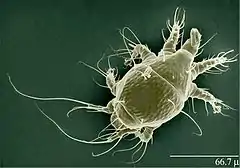Tarsonemidae
Les Tarsonemidae sont une famille d'acariens. Elle compte 45 genres et plus de 500 espèces.
Tarsonemidae

Image au microscope de Acarapis woodi.
Liste des sous-taxons
- Sous-famille des Acarapinae
- Tribu des Acarapini
- Tribu des Coreitarsonemini
- Tribu des Podotarsonemini
- Sous-famille des Pseudotarsonemoidinae
- Tribu des Tarsonemellini
- Tribu des Pseudotarsonemoidini
- Sous-famille des Tarsoneminae
- Tribu des Hemitarsonemini
- Tribu des Steneotarsonemini
- Tribu des Tarsonemini
- Tribu des Pseudacarapini
Quelques genres
- Acarapis
- Excelsotarsonemus
- Floridotarsonemus
- Phytonemus
- Polyphagotarsonemus
- Steneotarsonemus
- Tarsonemus
Publication originale
- (de) Kramer P., 1877. Grundzuge zur Systematik der Milben. Arch. Naturgesch. 43: 215–247.
Références
- (en) Kaliszewski M., 1978a. Two new species of mites (Acari, Tarsonemidae) from Poland. Bull. Acad.pol. Sci., CI. 11, Ser. Sci. biol. 26: 231–242.
- (en) Kaliszewski M., 1978b. Description of an abnormal specimen of Tarsonemus pallidus Banks (Acari, Tarsonemidae). Bull. Acad.pol. Sci., Cl. II, Ser. Sci. biol. 26: 617–619.
- (en) Kaliszewski M., 1979. Two new species of the genus Tarsonemus Canestr. et Fanzago (Tarsonemidae, Acarina) from Poland. Bull. Acad.pol. Sci., Cl. II, Ser. Sci. biol. 26: 771–778.
- (pl) Kaliszewski M., 1981 (non publiée). Tarsonemidae (Acari: Heterostigmae) Polski. Thèse de doctorat non publiée, A. Mickiewicz University, Poznán. 1072 pp.
- (en) Kaliszewski M., 1981. Study of Polish Tarsonemidae. IV. Description of the larva of Tarsonemus suskianus Kaliszewski n. nov. Bull. Acad. pol. Sci., Cl. II, Ser. Sci. biol. 28: 659–662.
- (en) Kaliszewski M., 1983a. Study of Polish Tarsonemidae. V. Description of Tarsonemus parafusarii n. sp. (Acari: Heterostigmae). Bull. Acad. pol. Sci., Cl. II, Ser. Sci. biol. 29: 385–392.
- (en) Kaliszewski M., 1983b. Study of Polish Tarsonemidae. VI. Description of Tarsonemus paralucifer n. sp. (Acari: Heterostigmae). Bull. Acad. pol. Sci., Cl. II, Ser. Sci. biol. 29: 393–400.
- (en) Kaliszewski M., 1983c. Study of Polish Tarsonemidae. VII. Description of Tarsonemus multiplex n. sp. (Acari: Heterostigmae). Bull. Acad.pol. Sci.. Cl. II, Ser. Sci. biol. 29: 401–407.
- (en) Kaliszewski M., Suski Z.W. & Rejman S., 1983. Individual variation in wild and laboratory reared specimens of Tarsonemus nodosus Schaarschmidt, 1959 (Acari: Tarsonemidae). Folia ent. Hung. 44: 63–81.
- (en) Kaliszewski M., 1984a. Some aspects of the systematics and evolution of the Tarsonemidae (Acari: Heterostigmae). p. 202–209 in Griffiths, D. A., and Bowman, C.E. (Eds.), Acarology VI (Proc. 6th int. Congr. Acarol., Edinburgh, Scotland, 1982), vol. 1. Ellis Horwood, Chichester, England.
- (en) Kaliszewski M., 1984b. Neotarsonemoides adae n. sp., n. gen. (Acari: Tarsonemidae) from Poland. Ent. Mitt. zool. Mus. Hamburg 8: 1–6.
- (en) Kaliszewski M., 1984c. Study of Polish Tarsonemidae. X. Description of Tarsonemus pumilis n. sp. (Acari: Heterostigmae). Acta Zool. Cracov. 27: 299–304.
- (en) Kaliszewski M. & Magowski W., 1985. Acaronemini n. tribe and Praeacaronemus rackae n. sp., n. gen., proposed for mites from the family Tarsonemidae (Acari: Heterostigmae). Em. Mitt. zool. Mus. Hamburg 8: 131–144.
- (en) Kaliszewski M., 1986. Key to the females of the Palearctic species of the genus Tarsonemus Canestrini et Fanzago, 1876 (Acari: Tarsonemidae). Adam Mickiewicz Univ. Press, Poznan.
Liens externes
- Ressources relatives au vivant :
- Global Biodiversity Information Facility
- (en) Australian Faunal Directory
- (cs + en) BioLib
- (en) BugGuide
- (sv) Dyntaxa
- (en) EPPO Global Database
- (en) EU-nomen
- (en) Fauna Europaea
- (mul + en) iNaturalist
- (en) Interim Register of Marine and Nonmarine Genera
- (en) NBN Atlas
- (nl) Nederlands Soortenregister
- (en + en) New Zealand Organisms Register
- (nl + en) Plant Parasites of Europe
- (en) Plazi
- (en) Système d'information taxonomique intégré
- Notice dans un dictionnaire ou une encyclopédie généraliste :
Cet article est issu de wikipedia. Text licence: CC BY-SA 4.0, Des conditions supplémentaires peuvent s’appliquer aux fichiers multimédias.